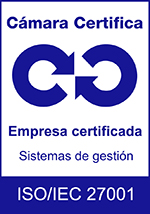What climate ambitions are we facing in 2022?
It is indisputable that the transition to a zero-emission economy requires a change in the way organizations and businesses operate. With an eye on this complex transformation process, this year’s annual meeting of the World Economic Forum should continue to raise the level of ambition of climate targets, focusing on three key areas.
- First, to obtain the commitment of world leaders to close the emissions gap and translate targets into concrete roadmaps.
- Second, to catalyze initiatives aimed at ensuring that this transformation takes place through a just and equitable transition.
- Thirdly, to mobilize society as a whole in demanding its expectations and in monitoring its leaders in the fulfillment of their commitments.
A McKinsey research on the net-zero emissions pathway adopted by Europe suggests that “climate technologies” that are already mature could, if widely deployed, help achieve about 60% of the emissions reductions needed to stabilize the climate by 2050. But there are missing climate technologies that are not yet ready, including 25 to 30 percent of technologies that are in the pilot phase but not yet mature, and another 10 to 15 percent that are still in the research and development phase.
The need for climate technologies is gigantic and pressing, and financial resources are being mobilized in unprecedented volumes to address this challenge. Investments in sustainability and environmental, social and corporate governance (ESG) objectives are growing as more and more companies are incorporating them into their business strategies.
Many companies are still immobile in the face of these changes and run the risk of being left behind because, although not all the technology is yet available and operational, it is advancing very quickly. Numerous start-ups are offering disruptive solutions and trying to position themselves as innovators or revolutionaries on this path towards a “net zero emissions” scenario by 2050. Sticking to conservative models carries great risks, including competitive dispositioning in the marketplace.
Directors and managers in all sectors face a major challenge on the road to decarbonization and emissions reduction, as they must incorporate these objectives into their entire business, leading a transformation that must be successfully completed.
A recent report from the BCG https://www.weforum.org/reports/winning-the-race-to-net-zero-the-ceo-guide-to-climate-advantage shows how by the end of 2020, more than 9,600 companies worldwide were reporting emissions data to the NGO CDP (formerly the Carbon Disclosure Project). Of these, some 3,000 had set emissions reduction targets, compared with fewer than 900 in 2017. More than 2,000 companies had set targets based on science-based criteria validated by the Science Based Targets (SBTi) initiative, compared to only 116 in 2015. (see image 2)
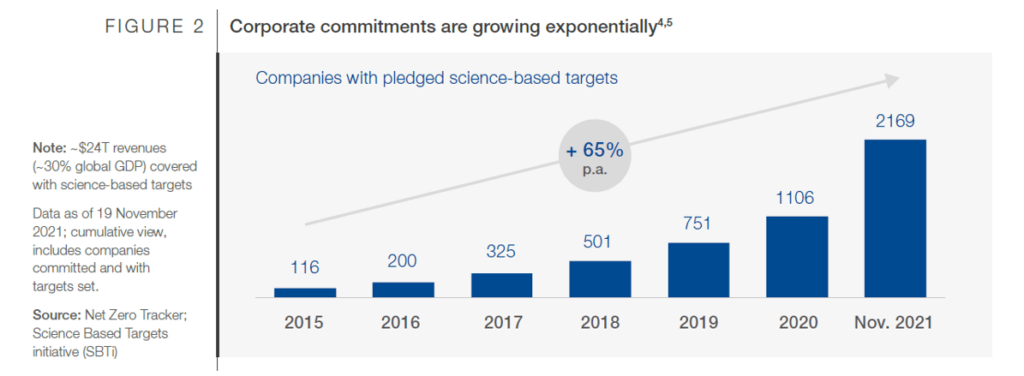
Continuing with BCG’s analysis, although business action is accelerating, the speed of transformation is still insufficient. Only 20% of companies publish their emissions across the value chain and have emission reduction targets. Only 9% of companies achieved an actual emissions reduction of more than 4% last year (the annual linear reduction needed to limit temperature increase to 1.5°C). (see image 5)
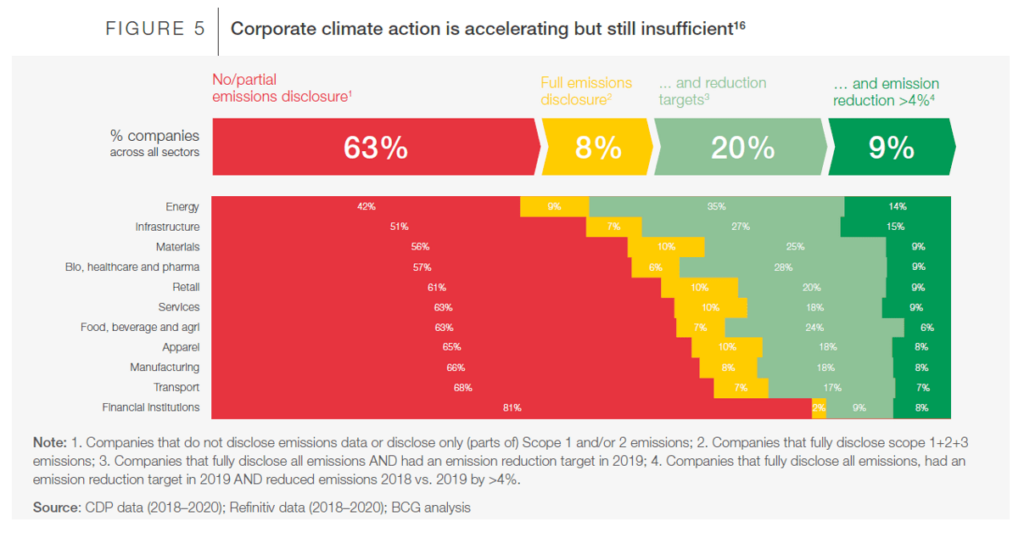
Analyzing the distribution by country, we can see that although 92 countries have made a formal commitment to net zero emissions, only eight are aiming to reach the target by 2050 and have implemented a national carbon pricing system. 22 countries and 5 US states, representing a total of 11% of global emissions, are leading the way by also having sectoral regulations for the energy, agriculture, transportation and manufacturing sectors. (see image 4)
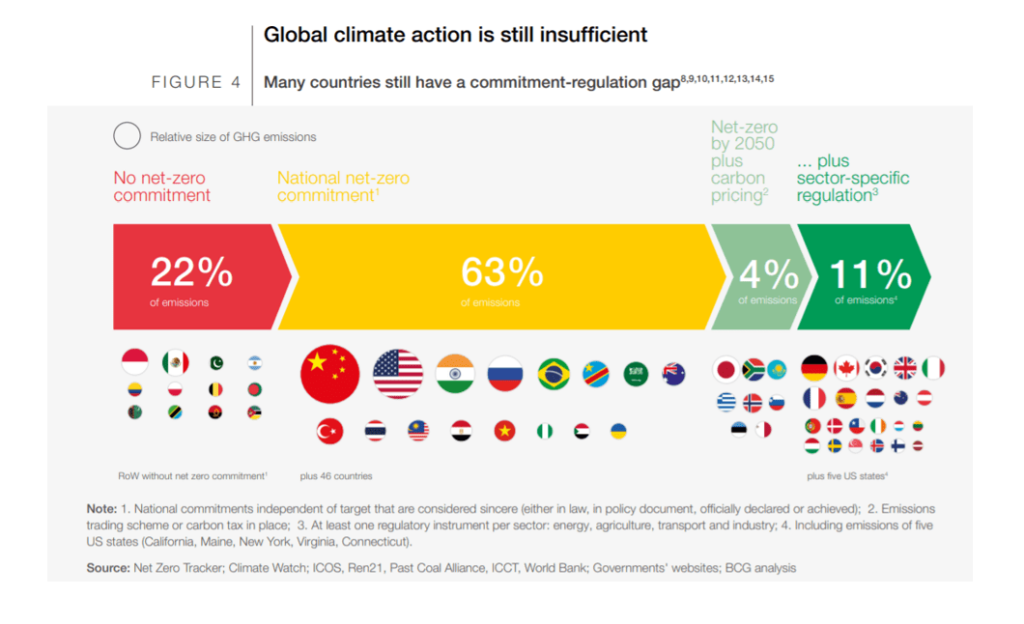
At this point, it is clear that these companies, which have made a commitment to incorporate sustainability, environmental improvement and emission reduction targets as priority objectives in their agendas and strategies, will enjoy great competitive advantages thanks to:
- Talent retention,
- Reducing exposure to risks generated by increased pollution, environmental damage, non-compliance etc.,
- Access to cheaper and more specific financing sources
These are some of the benefits that have been identified in these types of companies. (see image 14)
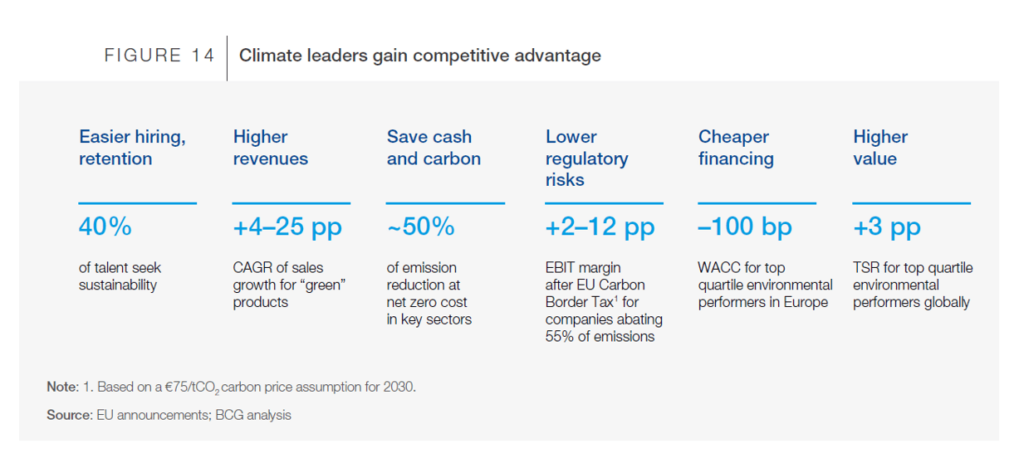
Many financial institutions already have specific financing programs to help and encourage companies committed to decarbonization.
If we look at BCG’s sectoral analysis of actual decarbonization projects, we can see that companies in almost every major sector can achieve significant cost savings by decarbonizing their scopes 1 and 2. Almost all companies can achieve a reduction of at least one third of their emissions at zero net cost to their business. And some companies even manage to decarbonize completely with zero net costs. (see image 16)
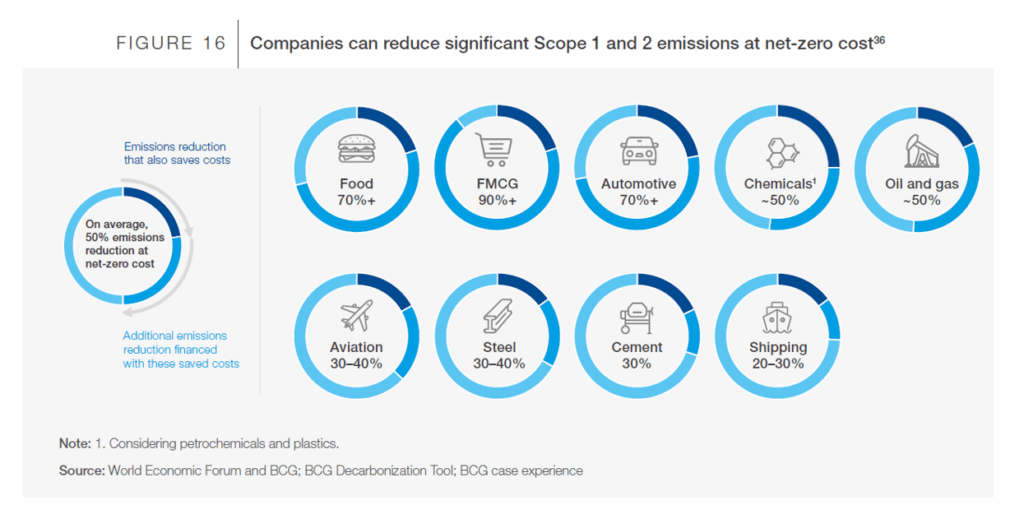
The message is clear to CEOs and their management teams: they face major challenges in the coming years to stay in a race that is moving faster than perceived. Companies that are lagging behind will have to incorporate these objectives as soon as possible if they do not want to be left behind for good, among other impacts:
a) access to advantageous financing
b) multiply its risks due to non-compliance
c) suffer from an increase in the digital divide in their organizations
d) delays in innovation
e) the loss of key talent.
In short, this revolution will require reinforcement in the safety of people, risk management, management and monitoring of sustainability policies, environmental management, emissions measurement, etc. Innovation projects and digitalization of these processes have become a priority as tools to achieve the ultimate goal of having a cleaner planet and reaching 2050 with zero net emissions.
About Laragon
We are a consulting firm based in Spain and Latin America specialized in process digitalization projects and we want to bring technology to the reach of organizations. Since 2006 we have been applying Innovative Technologies to improve key Business Processes in Sustainability Strategies: Environmental Management and Sustainability, Health and Safety, Risk Management and Regulatory Compliance. To learn more about Laragon, feel free to browse our website or send us an email at [email protected].



